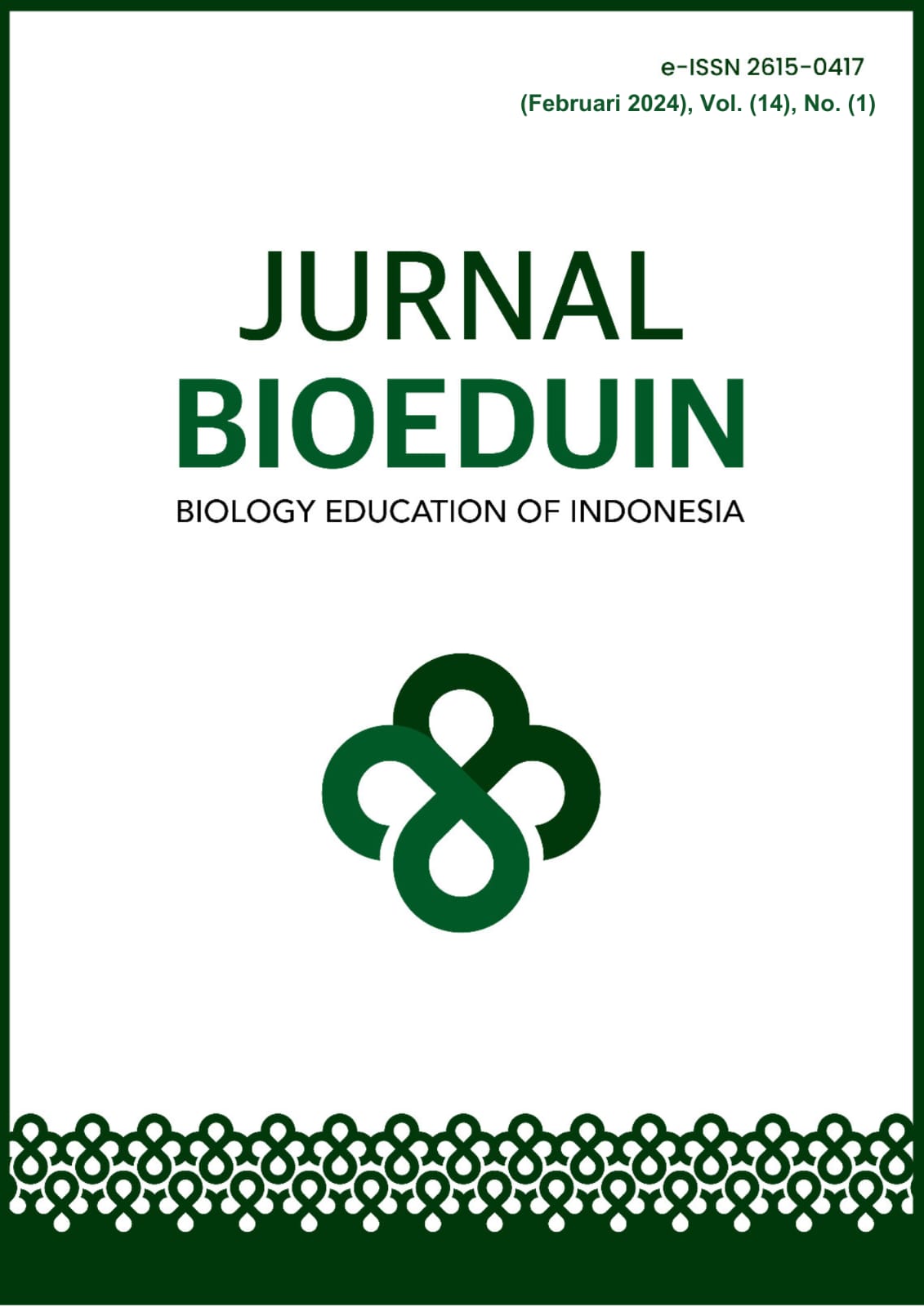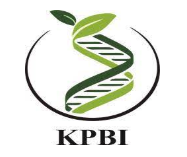Needs Analysis of Education for Sustainable Development-Oriented Textbooks in Biotechnology Courses
DOI:
https://doi.org/10.15575/bioeduin.v14i1.28508Keywords:
needs analysis, textbook, ESD, biotechnology coursesAbstract
References
Brundiers, K., Barth, M., Cebrián, G., Cohen, M., Diaz, L., Doucette-Remington, S., Dripps, W., Habron, G., Harré, N., Jarchow, M., Losch, K., Michel, J., Mochizuki, Y., Rieckmann, M., Parnell, R., Walker, P., & Zint, M. (2021). Key competencies in sustainability in higher education—toward an agreed-upon reference framework. Sustainability Science, 16(1), 13–29. https://doi.org/10.1007/s11625-020-00838-2
Cebrián, G., Junyent, M., & Mulà , I. (2020). Competencies in Education for Sustainable Development: Emerging Teaching and Research Developments. Sustainability, 12(2). https://doi.org/10.3390/su12020579
Craps, S., Pinxten, M., Knipprath, H., & Langie, G. (2022). Different roles, different demands. A competency-based professional roles model for early career engineers, validated in industry and higher education. European Journal of Engineering Education, 47(1), 144–163. https://doi.org/10.1080/03043797.2021.1889468
DÃaz-Méndez, M., Paredes, M. R., & Saren, M. (2019). Improving society by improving education through service-dominant logic: Reframing the role of students in higher education. Sustainability (Switzerland), 11(19). https://doi.org/10.3390/su11195292
Falqueto, J. M. Z., Hoffmann, V. E., Gomes, R. C., & Onoyama Mori, S. S. (2020). Strategic planning in higher education institutions: what are the stakeholders’ roles in the process? Higher Education, 79(6), 1039–1056. https://doi.org/10.1007/s10734-019-00455-8
Fernandez-Sanchez, G., Bernaldo, M. O., Castillejo, A., & Manzanero, A. M. (2014). Education for Sustainable Development in Higher Education: State-of-the-Art, Barriers, and Challenges. Higher Learning Research Communications, 4(3), 3. https://doi.org/10.18870/hlrc.v4i3.157
Filho, W. L., Manolas, E., & Pace, P. (2009). Education for sustainable development: Current discourses and practices and their relevance to technology education. International Journal of Technology and Design Education, 19(2), 149–165. https://doi.org/10.1007/s10798-008-9079-z
Fox, M. F. J., Zwickl, B. M., & Lewandowski, H. J. (2020). Preparing for the quantum revolution: What is the role of higher education? Physical Review Physics Education Research, 16(2), 20131. https://doi.org/10.1103/PhysRevPhysEducRes.16.020131
Furstenau, L. B., Sott, M. K., Kipper, L. M., MacHado, E. L., Lopez-Robles, J. R., Dohan, M. S., Cobo, M. J., Zahid, A., Abbasi, Q. H., & Imran, M. A. (2020). Link between Sustainability and Industry 4.0: Trends, Challenges and New Perspectives. IEEE Access, 8, 140079–140096. https://doi.org/10.1109/ACCESS.2020.3012812
Imara, K., & Altinay, F. (2021). Integrating education for sustainable development competencies in teacher education. Sustainability (Switzerland), 13(22). https://doi.org/10.3390/su132212555
Leal Filho, W., Dinis, M. A. P., Sivapalan, S., Begum, H., Ng, T. F., Al-Amin, A. Q., Alam, G. M., Sharifi, A., Salvia, A. L., Kalsoom, Q., Saroar, M., & Neiva, S. (2022). Sustainability practices at higher education institutions in Asia. International Journal of Sustainability in Higher Education, 23(6), 1250–1276. https://doi.org/10.1108/IJSHE-06-2021-0244
Leal Filho, W., Vargas, V. R., Salvia, A. L., Brandli, L. L., Pallant, E., Klavins, M., Ray, S., Moggi, S., Maruna, M., Conticelli, E., Ayanore, M. A., Radovic, V., Gupta, B., Sen, S., Paço, A., Michalopoulou, E., Saikim, F. H., Koh, H. L., Frankenberger, F., … Vaccari, M. (2019). The role of higher education institutions in sustainability initiatives at the local level. Journal of Cleaner Production, 233, 1004–1015. https://doi.org/10.1016/j.jclepro.2019.06.059
Lee, L.-S. (2023). New Challenges of Teaching Materials in STEM-Related ESD/SDG Activities in Taiwan. Online Submission.
Lokko, Y., Heijde, M., Schebesta, K., Scholtès, P., Van Montagu, M., & Giacca, M. (2018). Biotechnology and the bioeconomy—Towards inclusive and sustainable industrial development. New Biotechnology, 40, 5–10. https://doi.org/10.1016/j.nbt.2017.06.005
Milligan, L. O., Koornhof, H., Sapire, I., & Tikly, L. (2019). Understanding the role of learning and teaching support materials in enabling learning for all. Compare, 49(4), 529–547. https://doi.org/10.1080/03057925.2018.1431107
Moreno, Ã. G., Muñoz, L. L., & Morote, R. P. (2019). The role of higher education in development of entrepreneurial competencies: Some insights from castilla-la mancha university in Spain. Administrative Sciences, 9(1). https://doi.org/10.3390/admsci9010016
Müller, J. M., Kiel, D., & Voigt, K. I. (2018). What drives the implementation of Industry 4.0? The role of opportunities and challenges in the context of sustainability. Sustainability (Switzerland), 10(1). https://doi.org/10.3390/su10010247
Pálsdóttir, A., & Jóhannsdóttir, L. (2021). Key competencies for sustainability in university of iceland curriculum. Sustainability (Switzerland), 13(16). https://doi.org/10.3390/su13168945
Pauw, J. B., Gericke, N., Olsson, D., & Berglund, T. (2015). The Effectiveness of Education for Sustainable Development. 15693–15717. https://doi.org/10.3390/su71115693
Ramos-MejÃa, M., Franco-Garcia, M. L., & Jauregui-Becker, J. M. (2018). Sustainability transitions in the developing world: Challenges of socio-technical transformations unfolding in contexts of poverty. Environmental Science and Policy, 84(March), 217–223. https://doi.org/10.1016/j.envsci.2017.03.010
Shabbir, R., Javed, T., Afzal, I., El Sabagh, A., Ali, A., Vicente, O., & Chen, P. (2021). Modern biotechnologies: Innovative and sustainable approaches for the improvement of sugarcane tolerance to environmental stresses. Agronomy, 11(6). https://doi.org/10.3390/agronomy11061042
Verma, P., & Raghubanshi, A. S. (2018). Urban sustainability indicators: Challenges and opportunities. Ecological Indicators, 93(February), 282–291. https://doi.org/10.1016/j.ecolind.2018.05.007
Downloads
Additional Files
Published
How to Cite
Issue
Section
Citation Check
License
Authors who publish in Jurnal BIOEDUIN agree to the following terms:
- Authors retain copyright and grant the journal right of first publication with the work simultaneously licensed under a Attribution-ShareAlike 4.0 International (CC BY-SA 4.0) License that allows others to share the work with an acknowledgment of the work's authorship and initial publication in this journal.
- Authors are able to enter into separate, additional contractual arrangements for the non-exclusive distribution of the journal's published version of the work (e.g., post it to an institutional repository or publish it in a book), with an acknowledgment of its initial publication in this journal.
- Authors are permitted and encouraged to post their work online (e.g., in institutional repositories or on their website) prior to and during the submission process, as it can lead to productive exchanges, as well as earlier and greater citation of published work (See The Effect of Open Access).









